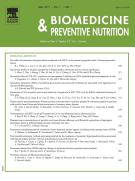Ethanolic neem (Azadirachta indica A. Juss) leaf extract induces apoptosis and inhibits the IGF signaling pathway in breast cancer cell lines - 14/03/12

Abstract |
We investigated the molecular mechanisms involved in the induction of apoptosis and antiproliferative activity exerted by ethanolic neem leaf extract (ENLE) on the human breast cancer cell lines. Two different breast cancer cell lines such as estrogen dependent (MCF-7) and estrogen independent (MDA-MB-231) cells were exposed to various concentrations of ENLE. The doses were fixed by cell viability (MTT) assay. IC50 values were 10μg/ml and 50μg/ml for MCF-7 and MDA MB-231 cells, respectively. For apoptotic detection caspase-3 activity and protein expressions of pro-apoptotic signaling molecules such as Bcl-2 associated X protein (Bax), Bcl-2-associated death promoter (Bad), cytochrome c, poly (ADP-ribose) polymerase (PARP) and anti-apoptotic protein B-cell lymphoma 2 (Bcl-2), further, mRNA expressions of Fas ligand (FasL), Fas associated death domain receptor (FADDR), B-cell lymphoma-extra large (Bcl-XL) and tumor necrosis factor-related apoptosis-inducing ligand (TRAIL) were studied by real time PCR. ENLE treatments increased the pro-apoptotic proteins and decreased the anti-apoptotic proteins thereby induced apoptosis in both the cell lines. Apoptosis is further confirmed in these two cell lines by rhodamine-123 and 4′,6-diamidino-2-phenylindole (DAPI) staining which clearly showed cell shrinkage and condensed nuclei in both ENLE treated cell lines. Insulin-like growth factor (IGF) signaling is presently considered as an anticancer treatment target and IGF signaling molecules such as IGF-1 receptor (IGF-1R), rat sarcoma (Ras), Raf, phosphorylated extracellular signal-regulated kinases (p-Erk), p-Akt and cyclin D1 were analyzed by western blot. ENLE treated cells significantly decreased the protein expression of IGF signaling molecules IGF-1R, Ras, Raf, p-Erk, p-Akt and cyclin D1. Our results suggested that ENLE induced apoptosis and decreased cell proliferation through the inhibition of the IGF signaling molecules in both MCF-7 and MDA MB-231 cells, which could be useful for breast cancer treatment.
Le texte complet de cet article est disponible en PDF.Keywords : Ethanolic neem leaf extract, Breast cancer cells, Apoptosis, IGF signaling
Plan
Vol 2 - N° 1
P. 59-68 - janvier 2012 Retour au numéroBienvenue sur EM-consulte, la référence des professionnels de santé.
L’accès au texte intégral de cet article nécessite un abonnement.
Déjà abonné à cette revue ?

